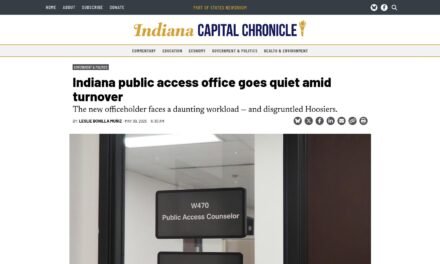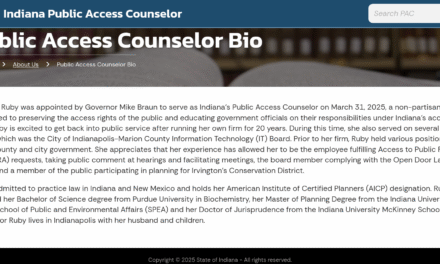Nikki Kelly of Ft. Wayne Journal Gazette wrote a story about William Groth asking to have his case be sent back to trial court instead of appealing to the Indiana Supreme Court in light of the recent uncovering that then-Governor Mike Pence used a personal AOL.com e-mail for official government business.
In Nikki’s article, Suit over emails takes turn, she writes:
Monday, William Groth asked instead that the case be sent back to the trial court to evaluate whether Groth’s original 2014 public records request included the private AOL account.
“With these new disclosures, Mr. Groth believes Governor Pence’s private email accounts may not have been reviewed as part the governor’s response to his public records request, and is concerned some of those messages may have been responsive to his request,” court filings said.
One email recipient – “MRP” – was identified as Pence but his office redacted the email address. The office of the governor then took the position that the disclosure of the confidential email address may jeopardize internal security if disclosed to the public.
Here is an excerpt from the Groth v. Pence, Ind: Court of Appeals 2017 decision:
In December of 2014, Governor Mike Pence made the decision that Indiana would join a Texas lawsuit against the President of the United States to contest certain presidential executive orders on immigration. In response, William Groth, a private citizen, submitted an APRA public records request to the Governor for records related to the Governor’s decision. The Governor responded to Groth’s request but, in doing so, partially redacted some of the documents and withheld another. The Indiana Public Access Counselor concluded that the Governor did not violate APRA. Acting on Groth’s ensuing complaint, the trial court also concluded that the Governor’s response was proper under APRA.
[…]
Groth appeals the trial court’s judgment for the Governor. Under the Indiana Code, the trial court’s review of Groth’s complaint for an alleged APRA violation was de novo, or without deference to the public agency[6] that denied the access, and the initial burden of proof in the trial court was on the agency. I.C. § 5-14-3-9(f), (g)(1).
[…]
We first consider the Governor’s argument on appeal that Groth’s APRA complaint is not justiciable. As the Indiana Supreme Court has explained:
justiciability is not a question of jurisdiction, but whether it is prudent for the Court to exercise its jurisdiction. . . .
The Indiana Constitution explicitly provides for the separation of powers: “The powers of the Government are divided into three separate departments; the Legislative, the Executive including the Administrative, and the Judicial; and no person, charged with official duties under one of these departments, shall exercise any of the functions of another, except as in this Constitution expressly provided.” Article 3, § 1. “[A]lthough the courts have jurisdiction to review [a] case in the first instance, justiciability concerns stemming from Article 3, Section 1, caution courts to intervene only where doing so would not upset the balance of the separation of powers.” Berry [v. Crawford], 990 N.E.2d [410,] 418 [(Ind. 2013)]. In other words, although this Court may have subject matter jurisdiction, it may, “for prudential reasons,” ultimately conclude that the issue presented is non-justiciable. Id. “[W]here a particular function has been expressly delegated to the legislature by our Constitution without any express constitutional limitation or qualification, disputes arising in the exercise of such functions are inappropriate for judicial resolution.” Id. at 421.[…]
In sum, we reject the Governor’s claim that executive privilege renders his response to APRA requests immune from judicial review. We also reject Groth’s argument that the trial court’s judgment violated his due process rights. We affirm the trial court’s judgment for the Governor on the merits of the Governor’s decision to redact or withhold the records in question.
[…]
VAIDIK, Chief Judge, concurring in part and dissenting in part.
I concur with the majority as to all issues except one. That is, I dissent from the majority’s conclusion that Governor Pence has met his burden of showing that the white paper is not subject to disclosure under APRA because it is a privileged attorney-client communication pursuant to the common-interest doctrine.[13]
You can read the entire decision here:
William Groth, Appellant-Plaintiff, v. Mike Pence, as Governor of the State of Indiana
Appellee-Defendant.No. 49A04-1605-PL-1116
Court of Appeals of Indiana
January 9, 2017
If you are following or covering this court case, please let us know. We want to include you in our upcoming podcast.





Recent Comments